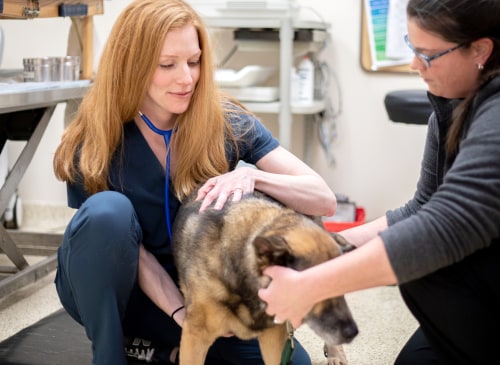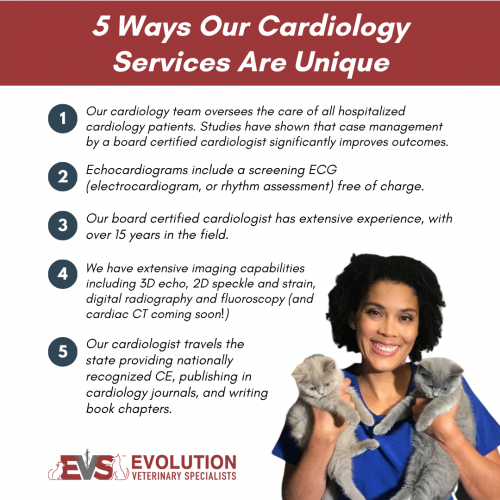Checking Out the Essential Solutions Supplied by a Vet Cardiologist: Understanding Ultrasound and CT Scan Techniques
Veterinary cardiologists play a crucial duty in the health of animals by identifying and dealing with numerous heart disease. They utilize advanced imaging methods, such as cardiac ultrasound and CT scans, to supply exact evaluations. Each method has its distinct advantages and applications. Comprehending these methods is necessary for pet dog proprietors looking for the very best treatment for their friends. What variables should pet dog proprietors take into consideration when picking in between these analysis tools?

The Function of Vet Cardiologists in Pet Dog Healthcare
Veterinary cardiologists play a crucial duty in the healthcare of animals, focusing particularly on detecting and dealing with heart-related problems. They possess specialized training that allows them to translate complicated analysis examinations and recognize numerous cardio issues. These professionals utilize sophisticated methods, such as echocardiography and electrocardiography, to examine heart feature and framework accurately.Veterinary cardiologists likewise establish customized therapy plans that may include medications, lifestyle modifications, and, in some situations, surgical interventions. Their proficiency reaches educating pet owners concerning heart wellness, stressing the relevance of normal check-ups and early discovery of possible troubles. Partnership with general veterinarians is essential, as it assures complete treatment for animals with thought heart concerns. By using specialized services, vet cardiologists substantially improve the lifestyle for pets and give tranquility of mind for their owners, enhancing the value of heart health and wellness in overall family pet wellness.
Usual Cardiac Issues in Pet Dogs
Typical heart problems in pets can substantially affect their wellness and lifestyle. Heart murmurs, different sorts of cardiomyopathy, and hereditary heart defects are amongst the most common problems that veterinarians run into. Ultrasound For Dogs. Comprehending these concerns is vital for pet owners to assure timely medical diagnosis and appropriate treatment
Heart Murmurs in Pets
Although heart whisperings can be a source of worry for pet dog owners, they are not always a measure of serious health and wellness concerns. A heart whispering is an abnormal noise created by stormy blood flow within the heart. In animals, these murmurs can be triggered by numerous factors, including congenital heart flaws, shutoff concerns, or perhaps stress during evaluations. Numerous family pets with heart whisperings lead typical lives without substantial wellness influences. To establish the underlying cause, vet cardiologists often employ diagnostic techniques such as echocardiograms and Doppler ultrasounds. Early detection and assessment are vital, as they may aid take care of any kind of possible heart problems efficiently. Animal owners are encouraged to consult their veterinarian for a complete evaluation if a heart whispering is spotted.
Cardiomyopathy Kind Explained
Cardiomyopathy incorporates a group of conditions influencing the heart muscular tissue, bring about compromised cardiac feature in family pets. The most typical types consist of dilated cardiomyopathy (DCM), hypertrophic cardiomyopathy (HCM), and restrictive cardiomyopathy (RCM) DCM largely impacts canines, causing the heart to increase the size of and deteriorate, which lessens its capability to pump blood efficiently. On the other hand, HCM is extra common in cats, defined by the thickening of the heart wall surfaces, typically resulting in blocked blood flow. RCM, though much less usual, happens when the heart muscle ends up being rigid, restricting its ability to loaded with blood. Each kind provides one-of-a-kind difficulties in medical diagnosis and treatment, demanding specialized veterinary cardiological examination to assure peak administration and treatment for affected family pets.
Genetic Heart Problems
Genetic heart defects represent a substantial category of cardiac concerns in pets, unique from obtained problems such as cardiomyopathy - Ultrasound For Dogs. These problems are structural problems existing at birth, affecting the heart's normal function. Typical kinds consist of license ductus arteriosus, ventricular septal defects, and pulmonic stenosis. Signs may differ extensively, varying from light to severe, and can include exercise intolerance, coughing, and difficulty breathing. Early diagnosis through sophisticated imaging methods like ultrasound is crucial for reliable management. Veterinary cardiologists play an important role in identifying these conditions and recommending suitable treatment options, which might consist of clinical administration or medical intervention. Acknowledging hereditary heart problems enables better end results and boosted lifestyle for influenced pet dogs
Recognizing Heart Ultrasound: Exactly How It Works
A significant number of vet methods now utilize heart ultrasound as an essential analysis device for assessing heart health in pets. This non-invasive strategy utilizes high-frequency acoustic waves to develop pictures of the heart's structure and feature. Throughout the procedure, a vet service technician applies a gel to the animal's upper body and utilizes a transducer to give off ultrasound waves. These waves bounce off the heart and bordering structures, creating real-time pictures on a monitor.Veterinarians can assess numerous elements of heart health and wellness, including chamber dimension, wall activity, and valve feature. Furthermore, heart ultrasound permits the discovery of irregularities such as fluid build-up and congenital heart flaws. This technique is essential for identifying problems that may not show up through standard radiographs. By supplying detailed details about the heart's composition and efficiency, cardiac ultrasound help in creating efficient therapy prepare for animals dealing with heart problem.
The Value of CT Checks in Diagnosing Heart Issues
Just how do CT scans enhance the diagnosis of heart disease in vet medicine? CT scans offer thorough cross-sectional photos of the heart and surrounding structures, permitting vets to visualize complicated physiological partnerships. This imaging strategy is particularly helpful in recognizing genetic heart defects, cardiac growths, and irregularities in capillary. By making use of innovative imaging formulas, CT scans can assess heart chamber sizes and function, providing a detailed sight that might be tough to accomplish with standard methods.Additionally, CT angiography can envision blood circulation and recognize locations of constriction or blockage, which is essential for planning possible treatments. The rate and precision of CT scans additionally facilitate fast diagnoses, crucial in emergency situation situations. Eventually, the consolidation of CT scans into veterinary cardiology greatly enhances the precision of medical diagnoses, allowing targeted treatment plans and improving person end results for pets dealing with heart disease.
Contrasting Ultrasound and CT Check Methods
While both ultrasound and CT scans are indispensable tools in vet cardiology, they supply unique advantages and constraints that affect their use in detecting heart disease. Ultrasound, or echocardiography, offers real-time imaging of the heart's framework and feature, allowing vets to examine heart chambers, valves, and link blood circulation. It is especially effective for reviewing conditions like heart disease and cardiomyopathy. Ultrasound may be restricted in imagining particular anatomical structures due to person size or obesity.In comparison, CT scans deal thorough cross-sectional pictures of the heart and bordering cells, making them optimal for identifying architectural abnormalities, tumors, or vascular problems. Although CT scans provide complete understandings, they need sedation and may entail radiation direct exposure. Eventually, the selection between ultrasound and CT scans depends upon the details medical situation, the person's problem, and the information needed for a precise medical diagnosis.
Therapy Alternatives Available Via Veterinary Cardiology
Veterinary cardiology uses a variety of therapy alternatives customized to resolve numerous heart problems in pets. Therapy strategies usually start with way of living alterations, consisting of diet regimen adjustments and workout changes, focused on enhancing general heart health and wellness. Medicines play an important role, with cardiologists prescribing drugs such as diuretics, beta-blockers, and ACE preventions to enhance browse around this site and manage signs and symptoms heart function.In a lot more serious cases, interventional treatments, such as balloon valvuloplasty or stent positioning, may be necessary to reduce blockages or boost blood flow. For certain congenital heart issues, surgical options might be checked out to fix architectural problems. Additionally, recurring surveillance and follow-up care are essential elements of a complete treatment strategy, permitting prompt modifications based on the family pet's reaction to treatment. In general, vet cardiology focuses on providing efficient, individualized like optimize the health and wellness and well-being of animal people with heart disease.
Just how to Prepare Your Animal for a Heart Assessment
Preparing a pet dog for a cardiac examination is important to ensure accurate results and a smooth procedure. Proprietors ought to initially set up the visit with the vet cardiologist and review any certain needs or issues. It is a good idea to hold back food for at the very least 12 hours before the analysis, as this helps enhance imaging high quality throughout treatments like ultrasound or CT scans.Additionally, maintaining a tranquil setting on the day of the appointment can help minimize the pet dog's anxiousness. It is advantageous to bring along any type of appropriate clinical documents, consisting of previous examinations and drugs (Cancer Veterinary Near Me). Owners should also ensure that their family pet is comfy and leashed during transport to the center. Lastly, acquainting themselves with the examination procedure can ease fears and aid in asking notified concerns during the appointment. By adhering to these steps, owners can add substantially to the performance of the heart assessment
Frequently Asked Inquiries
For how long Does a Cardiac Ultrasound or CT Check Take?
The duration of a heart ultrasound commonly varies from 30 to 60 minutes, while a CT check may take approximately 15 to half an hour. Aspects such as the client's problem can influence these time estimates.

Exist Any Type Of Threats Associated With These Diagnostic Treatments?

Can I Remain With My Family Pet During the Procedure?
The vet facility's policy typically determines whether family pet owners can continue to be during procedures. While some facilities motivate owner visibility for comfort, click here to find out more others might need separation to assure security and perfect problems for diagnostic imaging.
Just how Much Do These Diagnostic Examinations Normally Expense?
The costs of diagnostic examinations, such as ultrasound and CT scans, normally differ based on area and facility. Commonly, costs vary from a few hundred to over a thousand bucks, reflecting the complexity and technology entailed.
What Is the Healing Refine After a Cardiac Examination?
The recovery process after a heart evaluation includes monitoring the family pet for any kind of immediate reactions, making certain comfort, and limiting exercise. Veterinarians usually provide post-evaluation directions to assist pet dog owners during this necessary recovery period. Heart murmurs, different kinds of cardiomyopathy, and genetic heart defects are among the most common problems that vets run into. A heart whispering is an abnormal noise created by unstable blood circulation within the heart. Cardiomyopathy incorporates a team of conditions affecting the heart muscle, leading to compromised cardiac function in animals. Hereditary heart problems represent a considerable classification of cardiac problems in family pets, unique from obtained conditions such as cardiomyopathy. Ultrasound, or echocardiography, offers real-time imaging of the heart's structure and function, allowing vets to analyze heart chambers, shutoffs, and blood circulation.